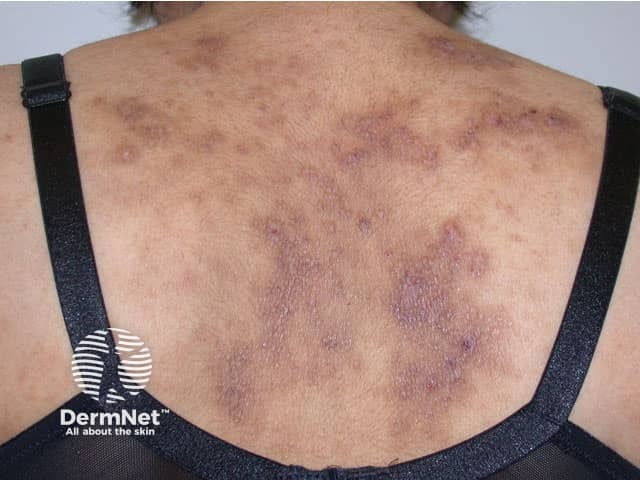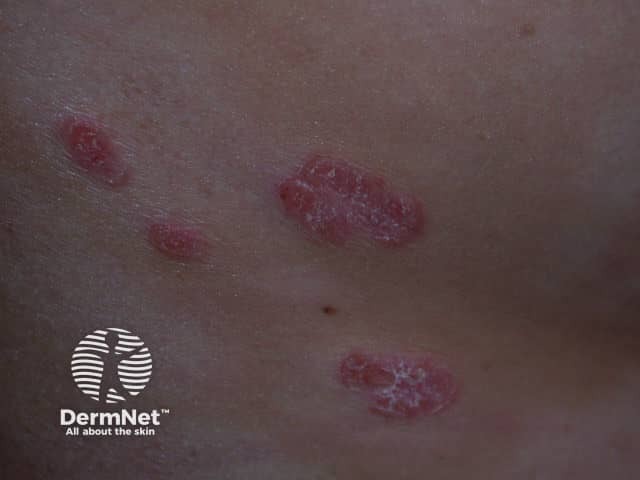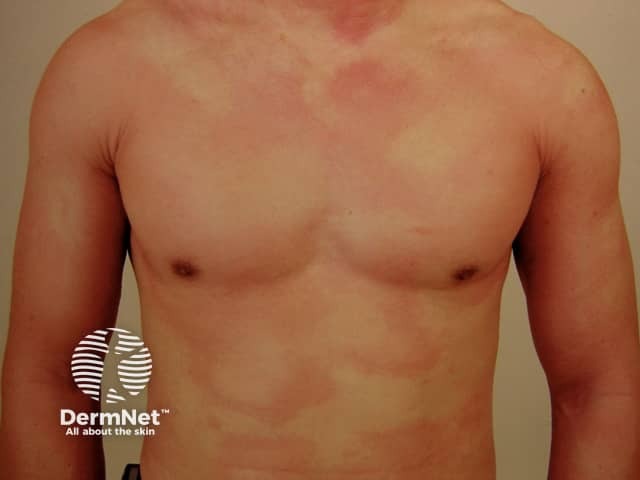Main menu
Common skin conditions

NEWS
Join DermNet PRO
Read more
Quick links
Dermatology patients and COVID-19 — extra information
Dermatology patients and COVID-19
Author: Yan Ling Apollonia Tay, Medical Student, University of Otago, Wellington, New Zealand. DermNet Editor in Chief: Adjunct A/Prof Amanda Oakley, Dermatologist, Hamilton, New Zealand. Copy edited by Gus Mitchell. March 2020. Reviewed by Dr Louise Reiche, Dermatologist, Palmerston North, New Zealand. Updated June 2020 by Medical Editor: Dr Helen Gordon, Auckland, New Zealand.
Submit your photo of COVID-19-related skin conditions
What is COVID-19?
COVID-19 (coronavirus disease 2019) is an infection caused by the virus SARS-CoV-2, that can lead to serious respiratory illness and can be fatal.
The World Health Organisation (WHO) declared on 11 March 2020 that the COVID-19 outbreak was officially a pandemic, as COVID-19 had spread rapidly worldwide [1].
Should my skin medications be stopped?
Commonly used systemic medications for severe skin conditions include immunomodulators or immunosuppressive drugs. These may include a biological agent, a disease-modifying anti-rheumatic drug (DMARD), or a systemic steroid. Dermatological medications are not known to increase the risk of acquiring COVID-19.

Atopic eczema

Psoriasis

Acute urticaria
Biological agents (biologics)
- In a study conducted between February 2020 and April 2020 examining 5206 patients in northern Italy on biological agents for psoriasis, there were no COVID-19 related deaths and only four required hospital admission [2].
- It is recommended a patient should continue a biological agent if they are well [3,4].
- Biological agents may be less effective if stopped for a period and then restarted due to production of anti-drug antibodies.
- Starting the use of a new biological agent should be considered on a case-by-case basis. It may be appropriate to delay treatment, particularly if there are risk factors for severe COVID-19 disease.
If you have tested positive (or are a presumed case) for COVID-19, the biologic medication should be STOPPED for at least four weeks or until you have fully recovered from COVID-19 [3,4]. You should inform any doctor involved in your care that you are on this medication.
Other immunomodulators and immunosuppressants
If you are currently well, and do not have any other chronic medical conditions [3,4]:
- Continue taking your medications as prescribed
- Remember that these medications were started to treat a severe, long-term medical condition
- The skin condition is very likely to deteriorate if the systemic medication is stopped suddenly
- The COVID-19 pandemic may continue on for years
- Those with risk factors for severe disease with COVID-19 should be reviewed on a case-by-case basis [3].
If you have tested positive (or are a presumed case) for COVID-19:
- Inform your doctor about your skin condition and the medications you are currently taking
- Immunomodulator or immunosuppressant medication should be STOPPED for at least four weeks or until you have fully recovered from COVID-19 [4]
- EXCEPT systemic corticosteroids used long term should not be abruptly stopped. Dose adjustments may be required and should be done on consultation with your doctor [4].
If you have cold or flu-like symptoms [4]:
- Local guidelines may apply; ask your doctor
- A dose reduction or treatment interruption for two weeks may be considered [4]
- Systemic steroids used long term should be continued; ask your doctor if you should stay on the same dose, increase it, or reduce the dose.
The influenza vaccine by intramuscular injection is highly recommended for all patients without contraindications. See immunisation in immunosuppressed dermatology patients.
References
- World Health Organisation. Q&A on coronaviruses (COVID-19). March 2020. Available at: www.who.int/news-room/q-a-detail/q-a-coronaviruses (accessed 23 March 2020).
- Gisondi P, Facheris P, Dapavo P, et al. The impact of the COVID-19 pandemic on patients with chronic plaque psoriasis being treated with biological therapy: the Northern Italy experience [published online ahead of print, 2020 Apr 28]. Br J Dermatol 2020 10.1111/bjd.19158. DOI: 10.1111/bjd.19158. PubMed Central
- Free access for COVID-19 articles — Uptodate.com
- Rademaker M, Baker C, Foley P, Sullivan J, Wang C. Advice regarding COVID-19 and use of immunomodulators, in patients with severe dermatological diseases. Australas J Dermatol 2020; 61: 158–9. doi:10.1111/ajd.13295. PubMed Central
On DermNet
- COVID-19
- COVID-19 images
- COVID-19 immunisation and immunomodulators/biologic agents
- Dermatology, COVID-19 infection, and SARS-CoV-2 vaccinations: Selected 2021 reference list
- Hand care for healthcare workers
- Personal protective equipment
- Systemic therapy
- Immunosuppressive drugs
Other websites
- Guide to donning and doffing Personal Protective Equipment (PPE) — Health New Zealand
- Unite for Recovery — New Zealand Ministry of Health
- Map tracks coronavirus outbreak in near real time — John Hopkins University
- Unite against COVID-19 — New Zealand Government
- Managing your practice through the COVID-19 outbreak — American Academy of Dermatology
- Check out your own symptoms for COVID-19 and your mental health at www.clearhead.org.nz
- CEBD Coronavirus Dermatology Resource
- Coronavirus resource center — American Academy of Dermatology
Registries
- The International Dermatology COVID-19 Registry
- PsoPROTECT registry — Australasian Psoriasis registry for cases of psoriasis with confirmed or suspected COVID-19
- SECURE-AD registry — for cases of atopic dermatitis with confirmed COVID-19
- Global HS COVID-19 Registry — for cases of hidradenitis suppurativa with confirmed or suspected COVID-19
